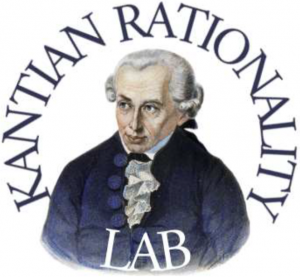KANTIAN RATIONALITY IN ETHICS:
FOUNDATIONS, APPLICATIONS, CHALLENGES
Online Conference
2nd Kantian Rationality Lab Conference,
14-16 May, 2021
Immanuel Kant Baltic Federal University (IKBFU), Kaliningrad
Organized by: Prof. Dr. Thomas Sturm, Prof. Dr. Nina Dmitrieva,
Dr. Martin Sticker & Dr. Andrey Zilber
Kant famously claims that reason is the foundation of morality. This is primarily a statement about the justification of the basic principles of ethics, but it has important implications for applied ethics as well. While Kant views the rational foundations of ethics as immutable – a contested view – there is little if any doubt that applications of his theory can develop as societal challenges develop. Some of the topics and problems to which Kant himself applied his theory are still pressing issues today, such as religious conflict, the foundations of democracy and the rule of law, or international politics; yet, they have changed in many ways. In addition, recent Kantian contributions to applied ethics have illustrated how his account can speak to problems that have emerged only more recently, such as questions of global justice in a highly interconnected world, the destruction of the environment, climate change, or problems that new technologies create for the rights of individuals, for instance to privacy. Studies of these problems have shown that a Kantian ethics centered on reason allows for high degrees of domain-specific applications and adaptability.
However, the possibility of these applications and adaptations raises a number of important questions concerning the prospects and limits of Kantian rationality in ethics. The conference aims to develop fresh perspectives on these issues in four related ways: Firstly, how are we to reconstruct Kant’s account of pure practical reason? What principles, procedures, and other properties shape the account and are crucial for renewing it? Secondly, how do these features guide concrete ethical reasoning in applied domains, both traditional and current ones? Under what conditions can they be employed in order to reason adequately about challenges arising from interactions between humankind and nature, humankind and new technologies, or the individual and society? Thirdly, how can we avoid the all-too human tendency towards what Kant calls “rationalizing” (Vernünfteln), the use of rationality to make up ex post excuses or pseudo-justifications in the service of one’s self-love? Fourthly and finally, what are prospects and limits of renewed versions of Kantian ethical rationality, particularly in applied domains?
Video records of talks – playlist
Program (CET=Kaliningrad time)
May 14 – Chair: Thomas Sturm
14:30 Thomas Sturm, Nina Dmitrieva & Martin Sticker: Welcome
14:45 David Bakhurst (Kingston, CA & Kaliningrad): Categorical Moral Requirements
15:45 Vadim Chaly (Kaliningrad): The Categorical Imperative as a Procedure: Formalizations and Applications
16:45 Break
17:15 Patricia Kitcher (New York): How the Moral Law is Central to Kant’s Theory of Practical Reason
18:15 Martin Sticker (Bristol): Kant on Rationalizing and Abuses of Reason
19:15 Break
19:45 Helga Varden (Urbana, IL): Kant and Arendt on Barbaric and Totalitarian Evil
May 15 – Chair: Nina Dmitrieva
14:30 Alexei Krouglov (Moscow & Kaliningrad): Russian Constitutional Law from the Kantian Point of View
15:30 Lea Ypi (London): A Permissive Theory of Territorial Rights
16:30 Break
17:00 Corinna Mieth (Bochum) & Garrath Williams (Lancaster): “Modern slavery” and Immigration Restrictions from a Kantian Standpoint
18:00 Herta Nagl-Docekal (Wien): How Kant’s Conception of the “Ethical State” Might Prove Relevant for the Current Debate on a Global Community
19:00 Break
19:30 Matthew C. Altman (Ellensburg, WA): Kant in the Time of COVID
May 16 – Chair: David Bakhurst
14:30 Konstantin Pollok (Mainz): A Kantian Response to Intergenerational Conflicts in Climate Change
15:30 Ludwig Nagl (Wien): Digital Technology: Kantian Reflections on the Difference Between Instrumental and Practical Reason
16:30 Break
17:00 Sergej Lugovoy (Kaliningrad): Kant’s Moral Interpretation of Religion and Its Potential for the Resolution of Religious Conflicts
18:00 Philip Kitcher (New York): Naturalizing Kant
This event is the second in a series of three international conferences organized by the Kantian Rationality Lab – an international research project located at the Immanuel Kant Baltic Federal University (Kaliningrad). The project, with currently 22 team members, focuses in study of Kantian rationality in philosophy of science, in ethics and in the project of Enlightenment.
Our conferences are supported by the Ministry of Science and Higher Education of the Russian Federation grant no. 075-15-2019-1929, project Kantian Rationality and Its Impact in Contemporary Science, Technology, and Social Institutions, Immanuel Kant Baltic Federal University (IKBFU), Kaliningrad.



